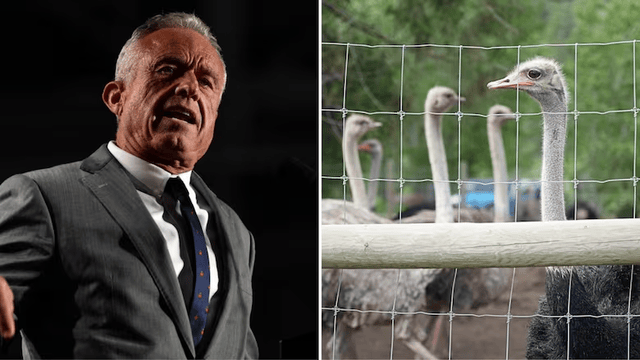
U.S. Health Secretary Robert F. Kennedy Jr. says in a post to X that he has met with Canadian health officials about sparing a flock of B.C. ostriches that have been ordered killed after avian flu was detected in two dead birds in December 2024. The Associated Press
A high-stakes standoff is brewing between Canadian officials and U.S. Health Secretary Robert F. Kennedy Jr. over the fate of 400 ostriches in British Columbia.
The birds, housed at Universal Ostrich Farm in Edgewood, were ordered culled after avian flu was confirmed in two dead ostriches last December. But Kennedy wants the flock spared, calling them potentially invaluable in the fight against the virus.
Kennedy Urges Science Over Slaughter
Kennedy recently spoke with Canadian Food Inspection Agency (CFIA) president Paul MacKinnon. He urged him to halt the planned cull and instead consider the ostriches for avian flu research.
In a letter co-signed by NIH Director Jay Bhattacharya and FDA Commissioner Martin A. Makary, Kennedy emphasized the potential of these long-living birds. He suggested they might offer critical insight into antibodies that could combat the virus.
The U.S. Department of Health and Human Services, NIH, and FDA have all pledged to assist in testing and research if Canada agrees to spare the birds.
CFIA Says No Exemptions This Time
Despite the appeal, the CFIA is pressing forward. Officials told CBC News the ostriches would be culled as per Canada's “stamping out” policy. This mandates the slaughter of all domestic birds on infected premises to prevent the spread of the highly contagious disease.
The policy applies to chickens, turkeys, ducks—and yes, even ostriches and emus.
While Universal Ostrich attempted to request an exemption, court documents show they failed to meet the necessary standards. No proof was offered that the flock was rare or genetically unique, such as breeding records or certification from recognized bodies.
Only one such exemption has ever been granted in Canada. That was in 2022, when a turkey farm demonstrated that uninfected animals were safely isolated.
At Universal Ostrich, however, CFIA inspectors reported breaches of quarantine. Wild birds, weasels, and unauthorized people were seen near the infected birds, which weakened the farm’s case.
Signs and a prop put up by supporters of Universal Ostrich. (Camille Vernet/Radio-Canada)
Kennedy Calls Culling Outdated and Ineffective
Kennedy, who previously expressed horror over the planned slaughter during a New York radio interview, argued the policy is outdated. He said the disease hasn’t reappeared in six months and that science—not fear—should guide the response.
His supporters agree. Dozens of them have gathered at the farm since a May 13 court ruling permitted the cull to proceed. The judge ruled the CFIA followed the law, adding that the court should not interfere in federal disease-control mandates.
Public and Political Pressure Mounts
Even politicians are voicing concern. B.C. Premier David Eby and independent MLA Jordan Kealy have criticized the CFIA's inflexibility. Kealy said many farmers feel helpless against a policy that ignores the complexity of managing animal health in outdoor settings.
The CFIA says it understands the emotional and financial toll of culling. That’s why ostrich owners can receive compensation—up to $3,000 per bird.
Experts Torn Over Right Course
Simon Fraser University professor Fiona Brinkman called the situation “tragic.” Speaking to CBC, she acknowledged the severity of avian flu but hoped CFIA would retest the ostriches.
Most domestic birds suffer over 90% mortality when infected. Ostriches, however, are surviving—but that might also allow the virus to linger.
“You can’t just barn ostriches like chickens,” she said. “But we need to investigate further. We owe that to science.”
As the clock ticks, the ostriches remain caught in the crossfire—between rigid policy and the hope of a scientific breakthrough.















